Description
Lionhead rabbit
Lionhead Rabbit Behavior and Temperament
Lionhead Rabbits make popular pets, but they may not be the best choice for first-time owners with children.
They’re generally smart, good-natured and playful, but they’re also one of the more timid domestic rabbit breeds. They can become easily frightened, and this can result in aggressive behavior.
They need a quiet, stress-free environment and should be handled with care. Gradually build up the contact you have with your Lionhead. Be patient and let them approach you on their terms, and make sure you have a tasty reward available, so they start to associate you with good things. Don’t rush into picking them up, and when you do, don’t restrain them tightly with no way to escape.
Lionhead Rabbits are intelligent little creatures. They need lots of enrichment and appropriate stimulation to prevent boredom from setting in. They need outlets for their natural digging and chewing behaviours. Not only is this much better for your rabbit’s general well-being, but it will save them selecting other, less appropriate items, around your house or garden.
Make sure they have a wide selection of rabbit-safe toys and chew items around their hutch and run. If they’re a house rabbit, you’ll need to work on redirecting to appropriate items and make sure you rabbit-proof the areas they have access to.
Housing the Lionhead Rabbit
Although the Lionhead is a small rabbit, they’re an active breed and need plenty of space to burn off energy.
Rabbits are sociable animals, and they do best when they have another bunny housemate. Your hutch should be big enough to accommodate at least two rabbits of a similar size. A hutch smaller than 6ft x 2ft won’t provide enough space.
Unfortunately, many rabbits are housed in hutches that are far too small for them, not appropriately sheltered from extreme weather, and that don’t give them the space to enjoy partaking in their natural behaviors.
Providing a run is also recommended and, ideally, this should be around 8ft. If the hutch can be connected to the run, this will be a great set up.
You should make sure that your Lionhead is housed somewhere out of extreme temperatures. They’re particularly susceptible to overheating, and it’s generally recommended that they’re kept in an area where temperatures don’t exceed 70 degrees Fahrenheit (21 degrees Celsius).
In colder months, if your rabbit is housed outdoors, extra hay should be provided for warmth, and they should be well sheltered from rain, snow and wind.
Your Lionhead Rabbits hutch and run area should be cleaned out at least once a week, and you should also perform regular deep cleans on bowls, toys and other accessories too. A dirty hutch can quickly become smelly, and the build-up of urine and feces can lead to health problems and bacteria growth.
Food and Water
Unfortunately, a lot of people don’t understand the nutritional requirements of a rabbit, and this can lead to digestive problems and, particularly, issues with their teeth.
Because rabbits teeth constantly grow, they need a diet that will naturally help their teeth to file down to prevent them from becoming overgrown. All rabbits should be given unlimited access to high-quality and high-fibre fresh grass hay, along with water. Fresh, leafy greens, like Kale, are also beneficial.
Steer clear of sugary fruits, unless it’s an occasional treat, and don’t fall into the trap of letting your Lionhead eat too many commercially prepared pellets. These can be okay in moderation, but they aren’t particularly fibrous and finding high-quality hay mixtures that they like is much more important.
Common Health Problems
Along with dental problems caused by overgrown teeth, Lionhead Rabbits can be prone to a couple of other health issues. Some of the most common are outlined below:
Respiratory Issues: These are particularly common in Lionheads that have flat faces. Brachycephalic features in Lionheads are becoming more popular as some people think it adds to their cute factor. Not all Lionheads have flat-faces, but if they do this can increase the chances of your rabbit having breathing difficulties, dental problems and digestive issues. They’re more likely to overheat more easily too.
Eye Problems: Because a Lionhead can have a flatter face than your average rabbit breed, they can be more prone to problems with their tear ducts. This can lead to eye infections and vision difficulties. You should bath their eyes with warm water regularly to keep them clean. If you see a persistent problem with eye boogers, tearing, or inflammation, you should seek veterinary advice.
Purchasing Your Lionhead Rabbit
Make sure that you go to a reputable breeder or rescue organization to find your Lionhead Rabbit. A bad breeder will mean your rabbit won’t have had the best start in terms of handling and socialization, and they may have an increased chance of ongoing genetic health problems.
Going to a Pet Store means you’ll not be able to find out as much information about the background of your Lionhead and how and where it was raised.
Lionheads come in a wide variety of color combinations, and the double-maned coats will require more grooming that the less profuse single-mane variety. A good breeder will be able to tell you which coat type a Lionhead will have from birth.
A good place to start your research would be through the American Rabbit Breeders Association.
Unfortunately, a lot of people underestimate the needs of rabbits, and lots end up in rescue. Reach out to your local rescue organization to find out if you can offer a Lionhead rabbit, or another similar breed, an adoptive home.
The House Rabbit Society has a comprehensive list of rabbit rescues across the country.
Litter Training
Because Lionhead Rabbits are very smart, they usually respond to litter training more quickly than your average bunny. Providing a designated spot for your rabbit to toilet in makes it easier to clean out their hutch, and can be useful when house rabbits have free access to areas in the home too.
Using a clear marker like a Clicker, followed by a tasty reward, can be an effective way to let your Lionhead know that they have done the right thing when they go potty in the litter tray. The training principles are exactly the same as they would be for a cat or dog.
Spaying or neutering your rabbit when they’re mature enough can also help to minimize any spraying in less appropriate areas. It’s also important if you have two rabbits of different sexes being housed together.
Best Grooming Practices
Lionheads have a greater amount of hair than your average rabbit, and this means that you need to be prepared to pay more attention to their grooming regime.
Their coat will need to be brushed out at least a few times a week to prevent uncomfortable knots or matting from developing.
Double-mane Lionhead Rabbits have a thicker mane and also thicker hair around their skirt (the hindquarters, hips, and tail). If their mane is a heavy double one, you should really brush them every day, especially during their annual molt.
A single-mane means the rabbit just has thicker hair around their head, ears and chest.
If you don’t lift the dead hairs out through brushing, this can lead to your bunny ingesting a lot of their fur when they’re grooming themself, and it can cause what is known as ‘wool-block’ which can make them seriously ill.
Because of their timid nature, you should build up the grooming experience gradually to minimize stress and allow them to form positive associations with the process. Keep the sessions short, comfortable and paired with yummy treats.

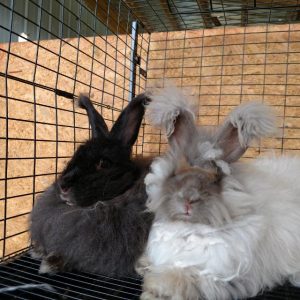
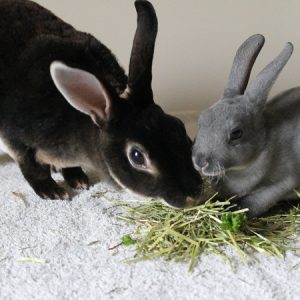
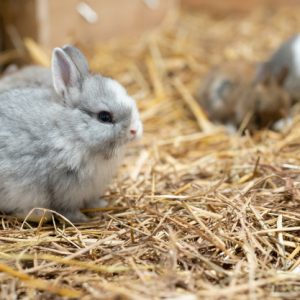
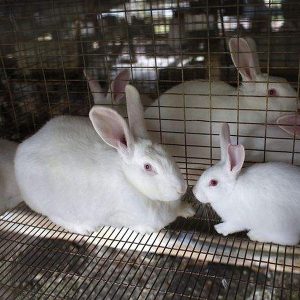

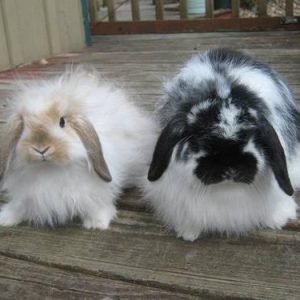
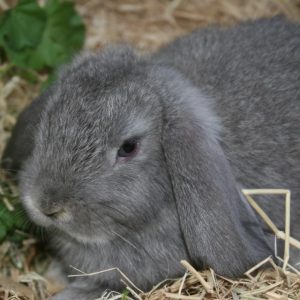
Reviews
There are no reviews yet.